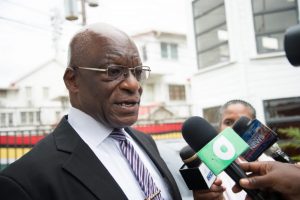─ maintains Cabinet cannot resign as it remains one of the three supreme Organs of Democracy
─ cannot leave the nation without a governing body
DPI, Guyana, Tuesday, March 12, 2019
Attorney General (AG) and Minister of Legal Affairs, Basil Williams SC., today argued that the Chief Justice (ag), Roxane George erred in her January 31 ruling and did not read the country’s Constitution in full.
Appearing before Chancellor of the Judiciary (ag), Yonette Cummings-Edwards and Appellate Judges Justices Rishi Persaud and Dawn Gregory, the attorney general presented arguments to support the application for an interim stay, which was filed following the ruling made by the acting Chief Justice on January 31, and a Conservatory Order preserving the status quo ante.
In January, the judgement handed down by the acting Chief Justice upheld the validity of the December 21, 2018 vote in the National Assembly, stating that the Cabinet should resign paving the way for new elections within three months unless an extension is agreed.

According to the attorney general, it was clear the acting Chief Justice considered Articles 106 (6) and 106 (7) in isolation when she ruled on January 31.
“I dealt with the question of the resignation of Cabinet on the night of the vote and this question of the President and Ministers couldn’t be in office after the expiration of the three month. I have shown authorities that that is not in fact so,” AG Williams told the media, minutes after the adjournment today.
Addressing Articles 106 (6) and (7) of the Constitution of Guyana, the Attorney General submitted that the Court give regard to the Cabinet and its members. He said there is no way the Cabinet can resign, as it remains one of the three supreme Organs of Democracy. The Cabinet is the trigger for government expenditure. It also has a responsibility to Parliament.
Article 106 (7) of the Constitution states:
“Notwithstanding its defeat, the Government shall remain in office and shall hold an election within three months, or such longer period as the National Assembly shall by resolution supported by not less than two-thirds of the votes of all the elected members of the National Assembly determine, and shall resign after the President takes the oath of office following the elections.”
The arguments today, on government’s behalf, was supported with the addition of by legal luminary, Former Attorney General of Grenada and now Senior Lecture of the University of the West Indies Cave Hill Barbados, Dr. Francis Raphael Alexis who said he was satisfied with today’s hearing.
“The Attorney General has highlighted issues that need to be addressed on an occasion like this, for example, what is the role of Cabinet and more importantly how is the state going to be run if the Cabinet cannot bring financial measures to the Assembly.”
He said the issues are very “weighty” and noted that Guyana is opening the eyes of the world, particularly the Commonwealth, about the issues that can arise when a country is charting its own way constitutionally.
“This is one for the law reports, to teach the rest of the world,” Dr. Alexis said.
The Attorney General vs The Speaker of the National Assembly and Opposition Leader’s case will hear more arguments tomorrow (March 13, 2019) in the Court of Appeal.
Alexis Rodney
Images: Marceano Narine
